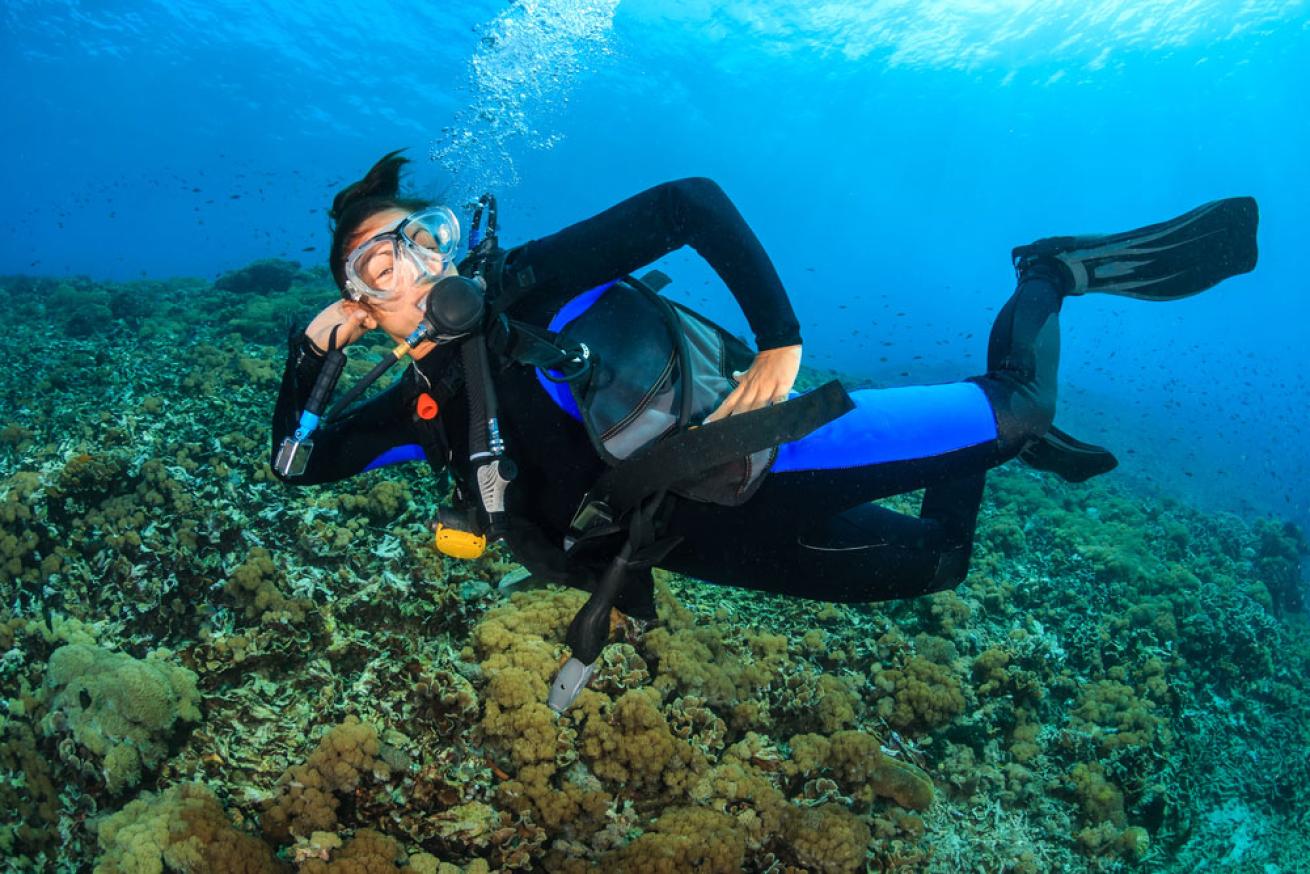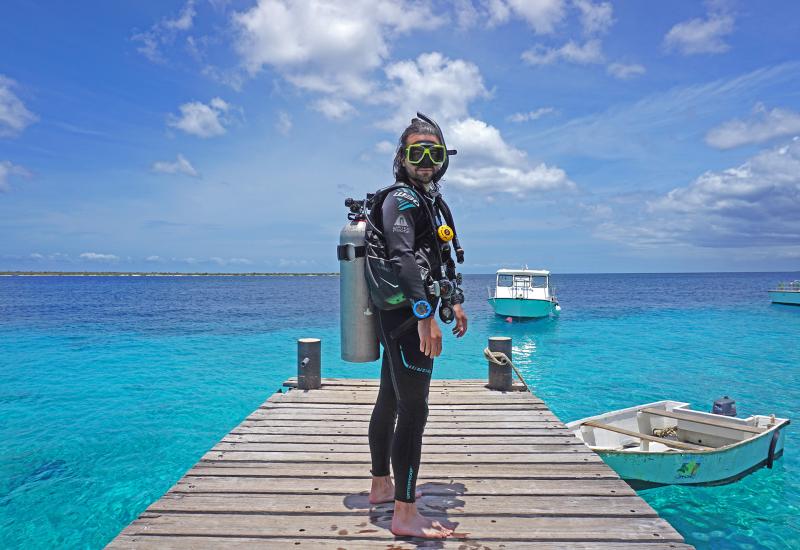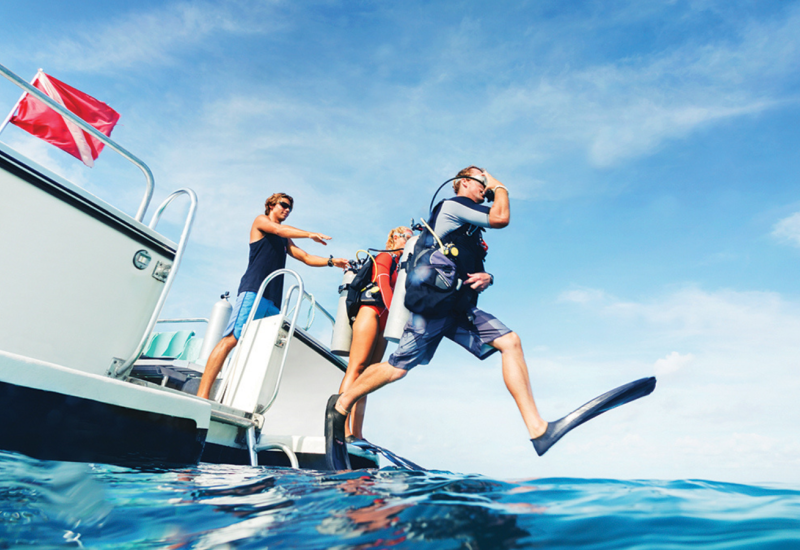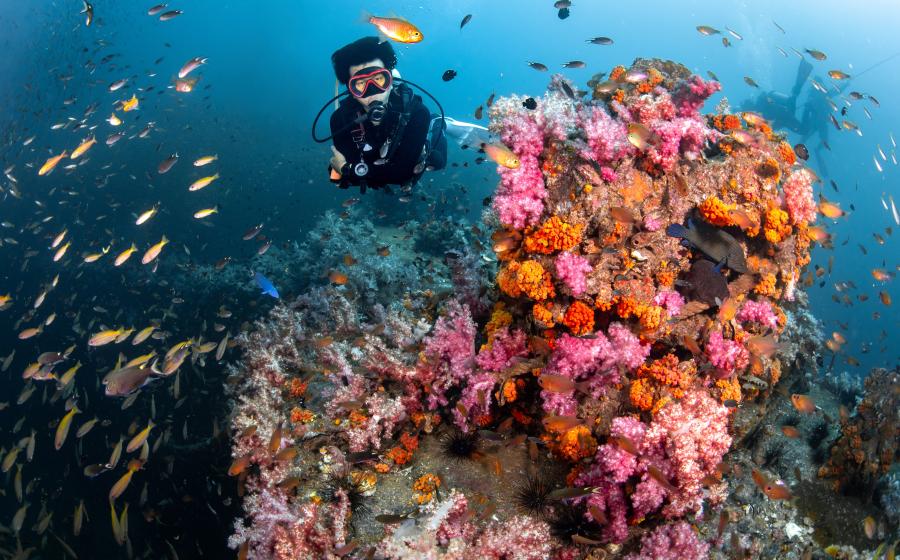Should You Pee in Your Wetsuit?

There is a well-worn joke that divers belong to two schools regarding peeing in their wetsuit: Those who do and those who lie about it.
Shutterstock
What Makes Me Want to Pee While Diving?
When diving, I suddenly get the urge to pee, even though I voided only minutes before. Why do I need to pee so soon?
This physiological phenomenon is known as immersion diuresis, a fancy term for your body's response to feeling under pressure. Blood is shifted to your body's core, and the hypothalamus gland thinks this means your total fluid volume is too high and instructs your kidneys to make urine. What can you do to avoid immersion diuresis?
-
Avoid diuretics like caffeine before you dive.
-
Intentionally dehydrating yourself might seem like a good idea, but dehydration increases fatigue and predisposes you to decompression sickness.
-
Try to stay warm. A side effect of your body's response to cold is the production of urine. Wearing a hooded vest under your wetsuit may save you from having to empty your bladder when you least want to. On the boat, stay out of the wind, bundle up and wear a hat.
-
Be healthy, sober and rested. A variety of over-the-counter and prescription drugs can interfere with your body's heat conservation mechanisms, typically by preventing the constriction of blood vessels near the skin. Antihistamines are particularly suspect. Alcohol is worse.
-
Although adipose tissue insulates well, allowing fat people to tolerate cold water immersion longer than lean people, it's better to be physically fit.
The Science of Warming Your Wetsuit
You try to hold it in, but can't. Desperate, you pee in your wetsuit. You hope no one will notice. But what can you do? Drink less water?
No, drink more.
The Dehydration Factor
-
Deliberately dehydrating yourself, in the hope you can hold it until the surface interval, just makes the embarrassment problem worse.
-
Because of immersion diuresis and your involuntary reaction to cold, chances are you'll have to pee anyway.
-
Dehydration makes the result stronger in odor and color.
The Embarrassment Factor
There is a well-worn joke that divers belong to two schools regarding peeing in their wetsuit: Those who do and those who lie about it. If you do have to pee in your wetsuit, know this:
-
If you're well-hydrated, your urine will be nearly clear and odorless. Almost like water. So who's to know?
-
There's no health risk to peeing in your wetsuit. Most people don't realize that urine is sterile, unless you already have an infection of the urinary tract. The worst you have to fear is a case of diaper rash if the urine stays against your skin several hours, and this too is less of a problem when your urine is diluted. Solution: Open your wetsuit under water and rinse it between dives.
The Warmth Factor
True or false? Urinating in a wetsuit is a quick way to warm up. False, and here's why: You may feel warm initially, but it will actually lower your body's warmth. And, if you're wearing a tight-fitting wetsuit that doesn't flush easily, a semi-dry or dry suit, then this warming-up technique loses a lot of its appeal.
What To Do with a Wetsuit that Stinks
It couldn't be helped. You felt the urge to pee during a dive, and so you did. Now you're afraid your wetsuit will stink. What should you do?
Give it a hot rinse. This is the most important part of regular stink prevention. Walk right past the rinse tank where other divers are busy dunking their suits in the filth rinsed off other gear, and go back to your room at the resort or home and rinse it in hot, fresh water. The easiest way to do this is to take your suit in the shower with you. Hot water is better than lukewarm water for breaking down salts from the ocean and from your body.
Hang it. After rinsing, hang your suit to dry on a wide wooden or plastic hanger, preferably one made for wetsuits. Use a wide hanger to keep the front and back of the suit apart so it can dry more quickly.
Soap it. Every once in a while give your suit a soapy bath. Scrub it well inside and out. Use a sponge on the slick neoprene and a soft-bristled brush on any nylon linings. Just about any kind of soap will work to kill the odor, but some are better than others. The best soaps for the job are commercially available "wetsuit shampoos" (check your local dive store) or a gentle baby shampoo. Next best are regular bath soaps and shampoos. Dish and laundry soaps are too harsh to use regularly on your wetsuit, but will do the job in a pinch. Never have your suit dry cleaned.
Deodorize it. If your suit still reeks, you might want to deodorize it. "Sink the Stink" (www.flinet.com/gulfstream/sts.html) is an all-natural deodorizer made specifically for de-stinking wetsuits.
Buying Prescription Dive Masks
I want to buy corrective lenses for the bottom windows of my mask. I don't wear glasses except to read small print, and need help to see things immediately in front of me, like gauges. How do I look at my prescription and know what lens to buy?
via e-mail
Prescription mask lenses can be expensive, especially if the wearer has a degree of astigmatism. A mask with magnifiers bonded onto the faceplate of the mask is another option, but may present problems with eventual erosion of the bonding substance used, or bubble formation.
The lens maker should provide you with the proper lens from the prescription that you are given. Usually, +2.0 would be adequate for underwater viewing.
Ernest S. Campbell, M.D., FACS, makes his home in Orange Beach, Ala. He is a retired surgeon, avid diver and webmaster of "Diving Medicine Online" (www.scuba-doc.com).
What Makes Me Want to Pee While Diving?
When diving, I suddenly get the urge to pee, even though I voided only minutes before. Why do I need to pee so soon?

ShutterstockThere is a well-worn joke that divers belong to two schools regarding peeing in their wetsuit: Those who do and those who lie about it.
This physiological phenomenon is known as immersion diuresis, a fancy term for your body's response to feeling under pressure. Blood is shifted to your body's core, and the hypothalamus gland thinks this means your total fluid volume is too high and instructs your kidneys to make urine. What can you do to avoid immersion diuresis?
Avoid diuretics like caffeine before you dive.
Intentionally dehydrating yourself might seem like a good idea, but dehydration increases fatigue and predisposes you to decompression sickness.
Try to stay warm. A side effect of your body's response to cold is the production of urine. Wearing a hooded vest under your wetsuit may save you from having to empty your bladder when you least want to. On the boat, stay out of the wind, bundle up and wear a hat.
Be healthy, sober and rested. A variety of over-the-counter and prescription drugs can interfere with your body's heat conservation mechanisms, typically by preventing the constriction of blood vessels near the skin. Antihistamines are particularly suspect. Alcohol is worse.
Although adipose tissue insulates well, allowing fat people to tolerate cold water immersion longer than lean people, it's better to be physically fit.
The Science of Warming Your Wetsuit
You try to hold it in, but can't. Desperate, you pee in your wetsuit. You hope no one will notice. But what can you do? Drink less water?
No, drink more.
The Dehydration Factor
Deliberately dehydrating yourself, in the hope you can hold it until the surface interval, just makes the embarrassment problem worse.
Because of immersion diuresis and your involuntary reaction to cold, chances are you'll have to pee anyway.
Dehydration makes the result stronger in odor and color.
The Embarrassment Factor
There is a well-worn joke that divers belong to two schools regarding peeing in their wetsuit: Those who do and those who lie about it. If you do have to pee in your wetsuit, know this:
If you're well-hydrated, your urine will be nearly clear and odorless. Almost like water. So who's to know?
There's no health risk to peeing in your wetsuit. Most people don't realize that urine is sterile, unless you already have an infection of the urinary tract. The worst you have to fear is a case of diaper rash if the urine stays against your skin several hours, and this too is less of a problem when your urine is diluted. Solution: Open your wetsuit under water and rinse it between dives.
The Warmth Factor
True or false? Urinating in a wetsuit is a quick way to warm up. False, and here's why: You may feel warm initially, but it will actually lower your body's warmth. And, if you're wearing a tight-fitting wetsuit that doesn't flush easily, a semi-dry or dry suit, then this warming-up technique loses a lot of its appeal.
What To Do with a Wetsuit that Stinks
It couldn't be helped. You felt the urge to pee during a dive, and so you did. Now you're afraid your wetsuit will stink. What should you do?
Give it a hot rinse. This is the most important part of regular stink prevention. Walk right past the rinse tank where other divers are busy dunking their suits in the filth rinsed off other gear, and go back to your room at the resort or home and rinse it in hot, fresh water. The easiest way to do this is to take your suit in the shower with you. Hot water is better than lukewarm water for breaking down salts from the ocean and from your body.
Hang it. After rinsing, hang your suit to dry on a wide wooden or plastic hanger, preferably one made for wetsuits. Use a wide hanger to keep the front and back of the suit apart so it can dry more quickly.
Soap it. Every once in a while give your suit a soapy bath. Scrub it well inside and out. Use a sponge on the slick neoprene and a soft-bristled brush on any nylon linings. Just about any kind of soap will work to kill the odor, but some are better than others. The best soaps for the job are commercially available "wetsuit shampoos" (check your local dive store) or a gentle baby shampoo. Next best are regular bath soaps and shampoos. Dish and laundry soaps are too harsh to use regularly on your wetsuit, but will do the job in a pinch. Never have your suit dry cleaned.
Deodorize it. If your suit still reeks, you might want to deodorize it. "Sink the Stink" (www.flinet.com/gulfstream/sts.html) is an all-natural deodorizer made specifically for de-stinking wetsuits.










